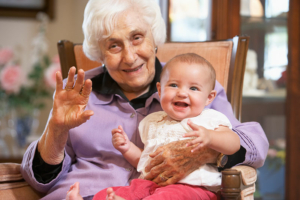The Grown-Up Version of Baby Talk: Avoiding Elderspeak

CareWorks Health Services recommends avoiding elderspeak when interacting with seniors.
Watch what happens at the next family gathering when a brand new mother places her infant in someone’s arms. The individual is likely to shift instantly into baby mode: a high-pitched, sing-song voice, overly-simplified speech, and exaggerated facial expressions. Of course, this is perfectly normal and actually good for an infant’s growing brain. Hopefully, however, when that child’s great-grandmother enters the room, family members avoid reacting similarly. However, it takes place so frequently, and can be so detrimental to the elderly, that there is a word to describe it: elderspeak. Avoiding elderspeak is essential when it comes to interacting respectfully with seniors.
A recent study by Susan Kemper, a professor who specializes in gerontology at the University of Kansas, matched elderly listeners with younger speakers. Even with the seniors’ instructions to simply listen without interrupting as the younger people spoke to them – thus leaving no hint to the speakers that they were having any difficulty understanding what was being said – overwhelmingly, the speakers resorted to elderspeak.
It is worthwhile to note as well that seniors regularly keep from using elderspeak with one another. Research has found that for many older adults, elderspeak conveys superiority and a cold attitude.
Why It’s Harmful
Simply put, elderspeak can be perceived as belittling and patronizing. It conveys beliefs of inferiority and incompetency to seniors, rather than the respect they deserve. While typically well-meaning and meant to communicate endearment, it typically has the reverse effect.
Tips for Avoiding Elderspeak
- Carefully consider how to address the older adults in your life. Many seniors find terms like “young lady,” “dearie,” or “honey” to be offensive.
- Use care when modifying the way you talk to an older adult according to individual need. For example, speaking clearly and slowly while facing a senior loved one with hearing loss is helpful. A high-pitched voice, however, may actually further distort the words. A senior with memory loss can better follow the conversation if it is broken down into simple, short sentences and yes-or-no questions. This can very easily be accomplished without resorting to baby talk.
- Don’t forget that there’s no one-size-fits-all approach, as each person has unique preferences and challenges. An open and honest conversation with the person about how precisely they would like to be addressed and spoken to is the ideal path to ensure you are engaging with them appropriately.
CareWorks Health Services places a great emphasis on respectful interactions with each older adult in our care. If you need an in home caregiver in Orange County or the nearby areas, reach out to us online or over the phone at (949) 859-4700 to schedule an in-home consultation. For a full list of all of the communities where we provide care, please visit our Service Area page.
